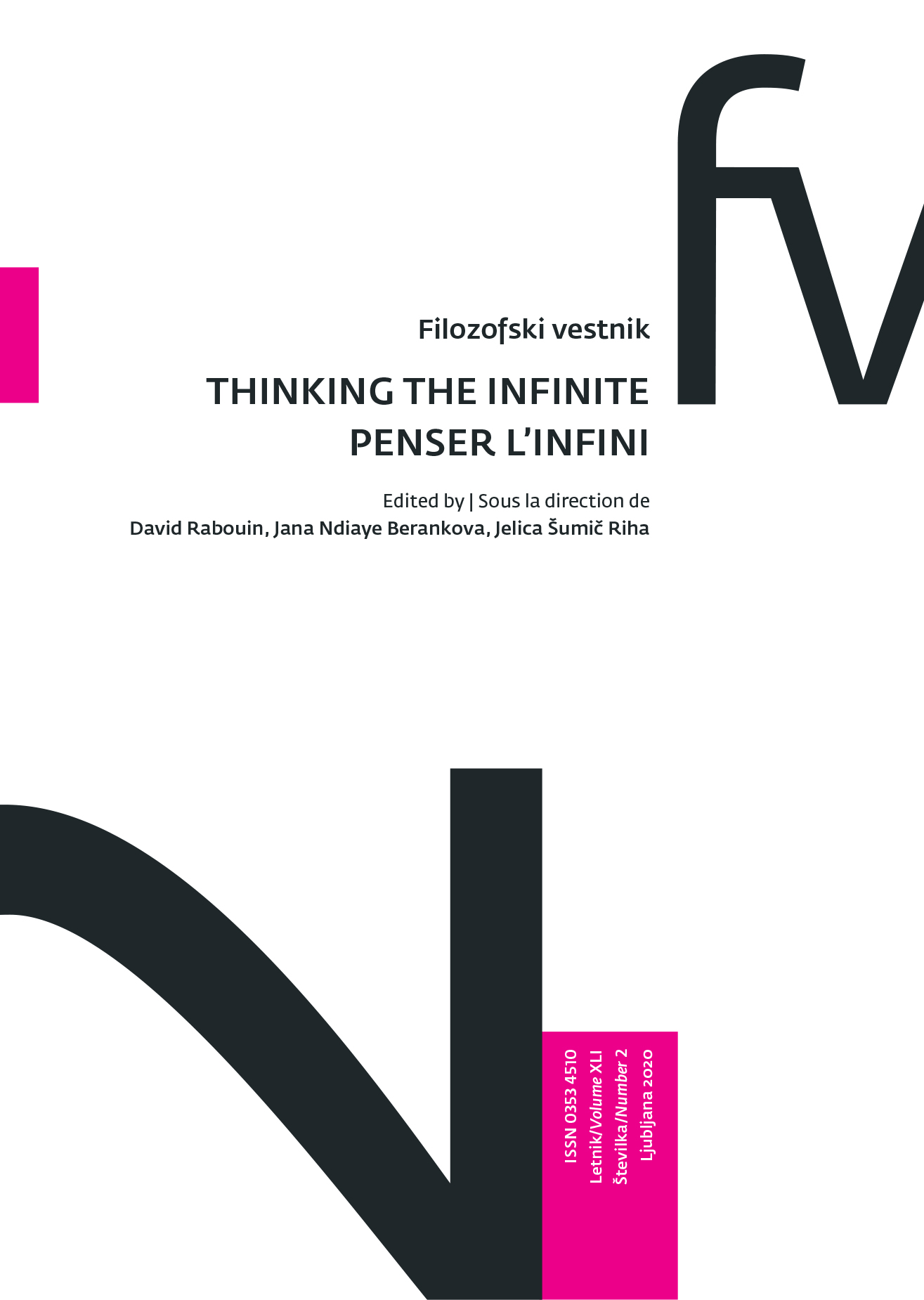»Ena ali mnoge ontologije? Badioujevi argumenti za njegovo tezo ‘Matematika je ontologija’.«
DOI:
https://doi.org/10.3986/fv.41.2.02Ključne besede:
ontologija, meta-ontologija, argument, izpeljan iz pogojev, argument, izpeljan iz filozofije, modeliranje, shematizemPovzetek
Pričujoči članek raziskuje med sabo tekmujoče interpretacije Badioujeve strategije, kot jo lahko razberemo iz trditve, »matematika je ontologija«, pri čemer se opira na njegovo konstrukcijo alternative Heideggerjevi zgodovini biti kot tudi na razkritje radikalne kontingentnosti »odločitev glede biti«, kot jih je mogoče zaznati v transformacijskih praksah v štirih pogojih filozofije: umetnosti, politiki, ljubezni in znanosti. Namen te preiskave je odpreti možnosti za drugačno strategijo, ki ustreza Badioujevi izvorni intuiciji, da je namreč bit mnoštvo, in sicer tako, da prenesemo pisanje mnoštva ontologij na področje delovanja.
Prenosi
Literatura
Badiou, Alain, Being and Event, trans. Oliver Feltham, Continuum Books, London and
New York 2005
— Briefings on Existence: A Short Treatise on Transitory Ontology, trans. N. Madarasz,
State University of New York Press, Albany 2006
— Court traité d’ontologie transitoire, Editions du Seuil, Paris 1998
— Le séminaire: Parménide, L’être I – Figure ontologique, Fayard, Paris 2014
— “Subversion Infinitésimale”, in Concept and Form, volume I: Key Texts from
the ‘Cahiers pour l’Analyse’, ed. Peter Hallward and Knox Peden, Verso, London 2012
— “Ontology and Politics: an Interview with Alain Badiou”, in Alain Badiou, Infinite
Thought: Truth and the Return of Philosophy, Continuum, London 2003
Besana, Bruno, “Quel multiple ?”, in Ecrits autour de la pensée d’Alain Badiou, pp. 23–40
— “Replique ; l’événement de l’être”, in Ecrits autour de la pensée d’Alain Badiou, pp.
–30
Brassier, Ray, “L’Anti-phènomene – présentation et disparaître”, in Ecrits autour de la
pensée d’Alain Badiou, ed. B. Besana and O. Feltham, Harmattan, pp. 55–64, Paris
Brassier, Ray and Alberto Toscano, “Postface: Aleatory Rationalism”, in Alain Badiou,
Theoretical Writings, Continuum, London 2005
Desanti, Jean-Toussain, “Some Remarks on the Intrinsic Ontology of Alain Badiou”, in
Think Again: Alain Badiou and the Future of Philosophy, ed. P. Hallward, Continuum,
pp. 59–66, London 2004
Feltham, Oliver, Alain Badiou: Live Theory, Continuum, London 2008
— Anatomy of Failure: Philosophy and Political Action, Bloomsbury, London 2013
— Destroy and Liberate: Political Action on the Basis of Hume, Rowman and Littlefield,
London 2019
Feltham, Oliver and J. Clemens, “An Introduction to Alain Badiou’s Philosophy”, in
Alain Badiou, Infinite Thought: Truth and the Return of Philosophy, ed. and trans. O.
Feltham and J. Clemens, pp. 1–38, Continuum, London, 2003
Gillespie, Sam, “L’être multiple présenté, représenté, rendu vrai”, in Ecrits autour de la
pensée d’Alain Badiou
Hallward, Peter, Badiou: a Subject to Truth, University of Minnesota Press, Minneapolis
Meillassoux, Quentin, “Décision et indécidabilité de l’événement” in Autour de ‘Logiques
des Mondes’, ed. O. Feltham, D. Rabouin and L. Lincoln, Editions des Archives Contemporains,
Paris 2011
Nancy, Jean-Luc, “Philosophy without conditions”, in Think Again: Alain Badiou and the
future of philosophy, pp. 39–49
Pluth, Ed, Badiou: a Philosophy of the New, Polity Press, London 2010
Wikipedia, “Barry Smith”, available at: https://en.wikipedia.org/wiki/Barry_Smith_(academic)
Tho, Tzuchien and Alain Badiou “The Concept of Model, Forty Years Later: An Interview
with Alain Badiou”, in Alain Badiou, The Concept of Model: an Introduction to the
Materialist Epistemology of Mathematics, ed. and trans. L. Fraser & T. Tho, re.press,
Melbourne 2007
Prenosi
Objavljeno
Kako citirati
Številka
Rubrike
Licenca
Avtorji jamčijo, da je delo njihova avtorska stvaritev, da v njem niso kršene avtorske pravice tretjih oseb ali kake druge pravice. V primeru zahtevkov tretjih oseb se avtorji zavezujejo, da bodo varovali interese založnika ter da bodo povrnili morebitno škodo.
Podrobneje v rubriki: Prispevki





